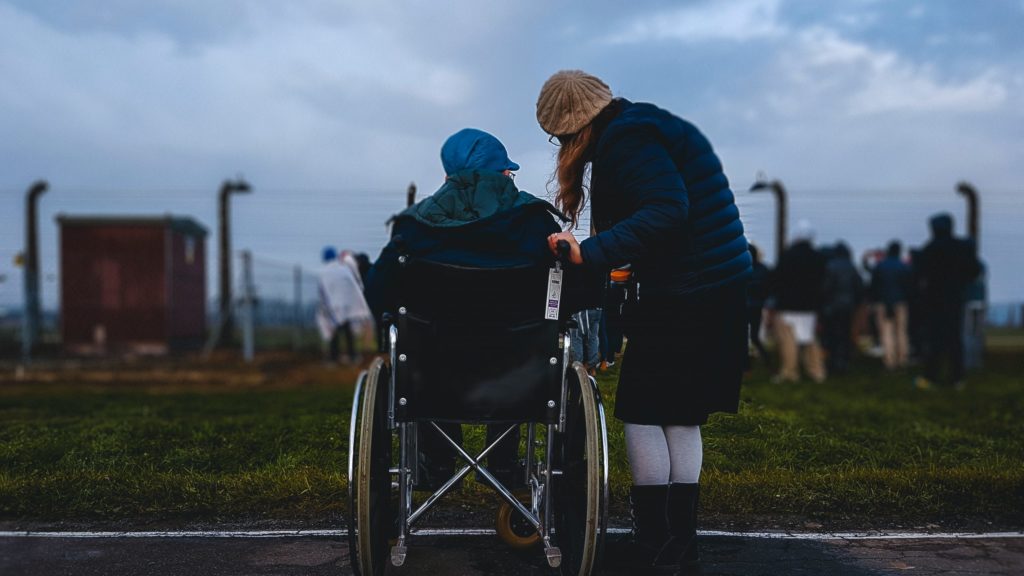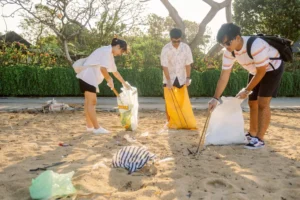Amy Julia Becker’s daughter Penny was born with Down syndrome, a chromosomal disorder that can cause developmental disabilities. For weeks and months after Penny’s birth, Amy Julia worried about how close of a relationship she and Penny would be able to have, and she tried to reconcile her faith and beliefs with Penny’s diagnosis.
Comments from friends and strangers further complicated her emotions. Amy Julia found that people often didn’t know how to talk about Down syndrome. As Penny grew and developed — later than typically-developing babies her age — many people couldn’t seem to see past her disability. Instead of seeing a beautiful little girl with her own unique personality, some simply saw a child who wouldn’t be “normal.”
Two ways of seeing
Our culture doesn’t typically value life that seems “imperfect.” While in some ways we are more welcoming to children with special needs than previous generations — more schools offer mainstreamed classes and some stores now include models with disabilities in their marketing — access to abortion continues to claim many children with disabilities before they are born.
We live in a very individualistic society that champions do-it-yourself-ism and pulling ourselves up by our own bootstraps. Too often we judge our own worth and value by what we can do, not who we are, so perhaps it comes as no surprise that we tend to look down on people who seem capable of less than others.
But our God doesn’t look at people with disabilities as less than.
The documentary “The Drop Box” shadows Korean pastor Lee Jong Rak and his wife Chun-ja as they raise several once-abandoned children, most or all of whom have special needs. We see the aging pastor sit on the floor to care for a child. We watch as the couple fills out medical paperwork for a toddler with a heart condition: “Put me as father,” the pastor tells his wife.
Over and over in the Gospels, Jesus spent time with and healed those who were lame or sick, and He told His followers to invite the crippled and the blind to eat at their tables. As pastor and author Rick Warren has said, “Consider…the marvel of a God who not only tolerates the feeble and lowly, but places special premium on defending and caring for them.”
Pastor Lee and Chun-ja are pictures of God’s care for people with disabilities. Do our lives reflect that care, too? If not, what can we do differently? How can we get to know people with disabilities? How can we follow Jesus’ example?
Volunteer. There are organizations everywhere that serve people with disabilities and their families. Many are Christian organizations, like Joni and Friends or Hope Heals. Reach out to one of these, or a local organization, and see if they have any volunteer needs that fit with your schedule. This actually leads in perfectly to the next point…
Find ways to educate yourself on what life can be like for people with disabilities. There are countless social media accounts set up by parents of children with Down syndrome or autism. There are YouTube videos reminding us of the worth of every person. Maybe even read a book by or about a person with a disability.
Ask. If you already know someone with a disability, don’t be afraid to (humbly) ask them (or in some cases, their family members) about their experiences. Be open about your desire to learn more about what people with disabilities’ experience, but be understanding if they don’t want to discuss it with you. If you know them well, consider asking if there is a way you could tangibly serve them — maybe they would even appreciate assistance with attending a church event.
My friend Elaina’s brother was born with cerebral palsy. She said that while a lot of people sometimes feel awkward when meeting someone who has a disability, it’s always best to start with greeting the person directly: “If they are severely handicapped and are going to be unable to respond, presumably they will have a caregiver, and the caregiver will step in to help in the response as needed,” she told me in an email. “But it’s always appreciated when people are treated like people.”
If you don’t know anyone with a disability, consider praying for the opportunity to get to know a person or family affected by disability. Be prepared for your ideas and expectations of “disability” or “different” to be stretched.
Everyone has a gift
I’m so grateful that God chooses to display His power through those who are weak. That’s me. That’s you.
It is God’s interest in those who are weak that paves the way for His interest in us. Do we realize that? Do we grasp that we are the feeble and lowly — maybe more so than those our society thinks are weak? “God sent them to earth with a purpose,” Pastor Lee says of his children.
As Amy Julia’s friends reached out to her after Penny’s birth, some said the right things, and some didn’t. But one comment especially stood out to her: “I can’t wait to see the ministry that Penny will have.”
“It hadn’t crossed my mind that Penny would have a ‘ministry,’ a means of giving to other people,” Amy Julia wrote in her book “A Good and Perfect Gift.” “And that simple sentence with its hopeful words made me realize…different didn’t mean less than. Penny would give to us. She would not only be blessed. She would be a blessing.”
We’ve each received a gift. What an awesome opportunity we have to see everyone around us display theirs.
Copyright 2022 Lauren Dunn. All Rights Reserved.












